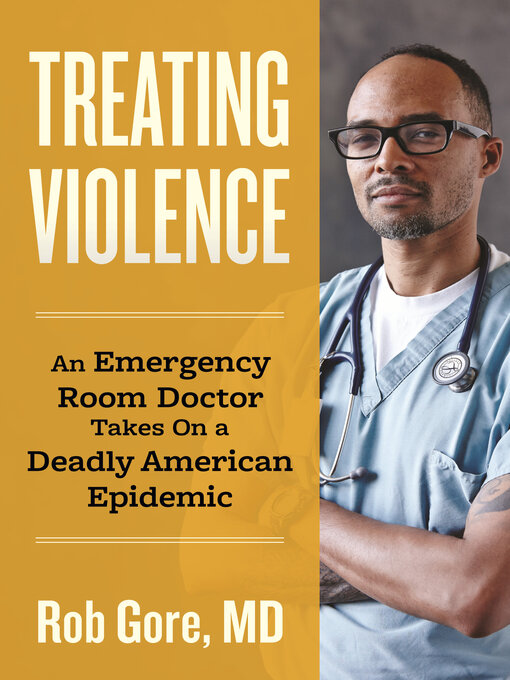Rob Gore first encountered violence when he was beaten and robbed as a 10-year old; it was treated as an inevitable fact of life, but after another brush with violence as a teen, he began to reject that prevalent attitude. As he matured and became a doctor, he grew in his determination to find treatments for what he saw not as an unavoidable fact for most people living in vulnerable, underserved neighborhoods especially, but as a public health issue that could be addressed by early intervention and solid support, beginning in the medical community. He also became deeply involved in efforts to diversify the entire field of medicine, starting with the “front lines” in the Emergency Department.
Seeing his brother, Angel, and close friend, Willis, fall prey to the epidemic of violence with profound—and in Willis’s case—deadly consequences, Rob began seriously researching the issue and went on to found an organization which is one of the models for successful approaches to reducing violence and protecting victims, who are disproportionately BIPOC, living in impoverished neighborhoods, or members of the LGBTQ+ community. Here he provides not only statistics, but stories of what he witnessed in NYC neighborhoods, in Atlanta, Chicago, Buffalo, and even in medical work in Haiti and Kenya. His work with the Kings Against Violence Initiate (KAVI) and allied organizations is a blueprint for treating violence not as a police matter, but as a public health crisis, which can and should be addressed and substantially reduced. The people he introduces us to in these pages are not merely victims, but often advocates, paving the way for eliminating the epidemic of violence in our country.
-
Creators
-
Publisher
-
Release date
May 7, 2024 -
Formats
-
Kindle Book
-
OverDrive Read
- ISBN: 9780807020197
-
EPUB ebook
- ISBN: 9780807020197
- File size: 859 KB
-
-
Languages
- English
-
Reviews
-
Kirkus
March 15, 2024
How health care workers might address lethal social dysfunction. The national plague of violence, argues emergency room physician Gore, should be treated as an actual plague--i.e., a public health emergency requiring the intervention of experts from a multitude of disciplines, including those in the medical profession. The author recounts a childhood in Brooklyn marred by actual and potential violence and explains how a desire to make his community safer influenced his decision to become a doctor serving those most in need. He testifies to the carnage he has routinely witnessed over two decades in the ER and notes the strikingly disproportionate toll violence takes on nonwhite and poor people. Gore uses sobering mortality statistics to record the extraordinary human suffering generated by gun violence in the U.S., and he delivers searing descriptions of traumatic hospital scenes, several of which involve his own friends and family members. The credible and timely prescription Gore offers is to augment programs that address, in holistic ways tailored to specific communities, some of the root causes of violence. As he argues persuasively, a preventive approach holds great potential for the most vulnerable: "Rather than locking people up, containing them in communities with minimal resources and limited support, let's treat the trauma and provide alternatives and, above all, head off violence before it even happens." Gore's account of his work with the Kings Against Violence Initiative, a nonprofit focusing on mentoring at-risk youth and providing much-needed social services, demonstrates how successful such strategies can be, especially if they involve members of the health care community and identify signs of social pathology in their early stages. "America is at war with itself," the author concludes, and cycles of violence can only be broken with committed, well-informed modes of intervention. A frank, powerful argument for public health initiatives addressing violence.COPYRIGHT(2024) Kirkus Reviews, ALL RIGHTS RESERVED.
-
Booklist
April 15, 2024
In this fast-paced title, emergency department physician Gore explains what drove him to establish efforts and organizations with a new approach to "treating violence" against people of color and the LGBTQ+ community. From the loss of a friend that begins the book to flashing back to the lifelong struggles of a foster brother, the author relies on his firsthand exposure to nearly relentless physical violence, largely committed against young Black men, to convey his frustration with the status quo. Determined to make positive change in the lives of those around him, he writes of developing Minority Medical Student Emergency Medicine as a way to recruit and support more Black and Latino medical students and, even more importantly, the group effort he led to establish the Kings Against Violence Initiative as a data-supported hands-on violence intervention program. Gore digs deep into the statistics of the problems he's tackling and practically provides a book-length analysis of what works and doesn't when interceding in systemic violence on a personal and neighborhood level. He blends intimate stories of those he has worked with alongside results gleaned from academic studies. A vibrant and educational consideration of a devastating urban and global public problem by a CNN Hero.COPYRIGHT(2024) Booklist, ALL RIGHTS RESERVED.
-
Formats
- Kindle Book
- OverDrive Read
- EPUB ebook
Languages
- English
Loading
Why is availability limited?
×Availability can change throughout the month based on the library's budget. You can still place a hold on the title, and your hold will be automatically filled as soon as the title is available again.
The Kindle Book format for this title is not supported on:
×Read-along ebook
×The OverDrive Read format of this ebook has professional narration that plays while you read in your browser. Learn more here.


